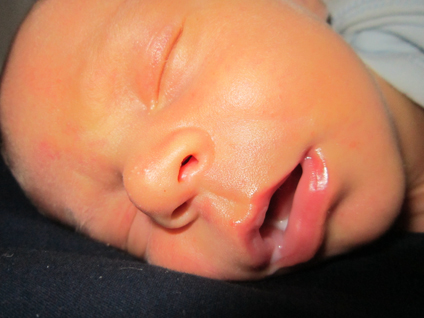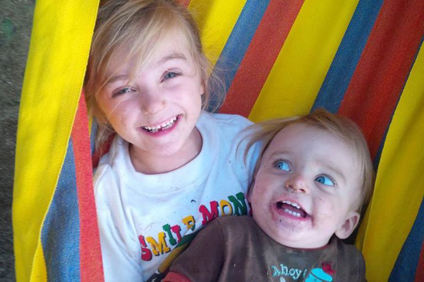The stories about your experiences with natural parenting and guilt have started arriving in my inbox and they are by turns amazing and distressing and often both. One story struck me so profoundly that I asked permission of the author, Adrienne, to share it with you. It is an object less in how lactivists in their ignorance and commitment to the ideology that “every woman can breastfeed” cause harm to both mothers and babies. Thank you, Adrienne, for your submitting your eloquent and powerful story. I’ve excerpted your story below, but posted it in its entirety here. I hope that by reading it lactivists, lactation consultants, obstetricians and nurses can learn to be more knowledgeable and compassionate.
I found out I was pregnant with my first child in January of 2008. Despite being only 19 years old at the time I knew from the start that I wanted to breastfeed her. I asked my doctor about my breasts, they aren’t like other women’s breasts. One is long and tube shaped (kind of like a golf ball in the end of a tube sock); the other is prepubescent flat; my areolas are huge in proportion to the rest of my breasts. I was told that all breasts make enough milk, no matter what the size or shape.
My labor with her wasn’t how I had imagined. Never in my wildest dreams did I think it would be so hard. At the 21 hour mark I got my epidural; I had been begging for the epidural since hour 8 or 9 but was told I couldn’t have it because they didn’t want to “stall” my labo. She was born “sunny side up” and I tore badly and hemorrhaged. I barely remember seeing her for the first time, let alone holding her or breastfeeding her. She was supplemented with formula from the start and after a few weeks I gave up, thinking that I wasn’t successful at breastfeeding because I just didn’t try hard enough (I really didn’t try that hard at all).
The hospital staff and my OB were extremely supportive of me. My daughter’s doctor was a different story. During her 8 week appointment he asked me if I was still breastfeeding. I told him I had stopped breastfeeding two weeks prior when I had a second hemorrhage. He was aghast. He told me “you should go back to breastfeeding, it’s not too late, just cut out the bottles! You’ll love it, she’ll love it, and putting her needs over your feeling tired is what being a mom is all about”. I was crushed.
My daughter grew normally and rarely got sick until just after her first birthday. She started getting recurrent infections and would frequently lose weight (10-15% of her body weight at times). She was tested for every condition under the sun. Every test came back normal. During this time I received a few comments along the lines of “if you had breastfed her, her immune system wouldn’t be so weak”. These comments NEVER came from her care team, the staff at the children’s hospital .
In December 2012 I found out that I was expecting my second child. This time I was 100% committed to breastfeeding, I convinced myself that my son wouldn’t go through what his older sister went through, that if I breastfed him he wouldn’t get sick the way she did. My pregnancy with my son was complicated. I went into preterm labor at 29 weeks. Thankfully, the doctors and nurses were able to stop my contractions. I went into preterm labor several more times, but my son stayed put until 39+4.
Labor with my son, Harrison, was the complete opposite of labor with my daughter. My labor was 4 hours, start to finish. I didn’t hemorrhage this time and I immediately had skin-to-skin time, he latched like a champ and breastfed for the first time about 20 minutes after he was born. I just knew that this time things would be different, and I would be able to give him the strong immune system that I didn’t give my daughter.
Before we were discharged the pediatrician told us that had lost just under 10% of his weight and was mildly jaundiced. He assured me that he probably lost the weight because he was jaundiced and to wake him up to feed every 2 hours, round the clock.
We went home on a Saturday and the public health nurse came for a weight check the following Monday. He had lost another two ounces. She assured me that it can be normal for jaundiced babies to take a while to gain back to their birth weight and that my milk was just late coming in. He was having enough wet and dirty diapers (barely) so she said to just stay the course.
A few days later I was concerned because he looked more jaundiced to me so I took him to his doctor. They tested him and his bilirubin levels were in the 280s (μmol/L). His doctor gently suggested that I think about supplementing Harrison’s feeds with formula. I pleaded with his doctor to let us try a little longer and his doctor reluctantly agreed, but I had to bring Harrison back to retest his bilirubin levels every second day.
During this time I was completely convinced that I was doing something wrong. I saw the lactation consultant almost every second day trying to perfect his latch, I pumped after every feed, I chugged water like it was going out of style, I took supplements, I tried everything and nothing worked. Still, I plowed forward, blind to the fact that my son was suffering because of my desire to exclusively breastfeed him.
At his three week appointment he was still 4oz below his birth weight, he was dehydrated and his fontanel was sunken, he never cried (he didn’t have the energy), and his bilirubin levels were still in the 280s. He was starving. His doctor sat me down and said that I had to either start supplementing immediately or we needed to admit Harrison for IV hydration. I cried harder than I ever had before as I gave him that first bottle.
I started looking online for a reason why and I stumbled across the blog “Diary of a Lactation Failure”. Suddenly it all made sense. I had every marker for IGT [Insufficient glandular tissue, explanation and pictures here]. Every single one. I went back to the lactation consultant and asked if I had IGT; yes, she had thought that for quite some time. To her credit she was amazingly supportive. She told me that supplementing didn’t mean that I couldn’t have a breastfeeding relationship with my son. She gave me the tools to make a homemade SNS [supplementary nursing system], and recommended domperidone. I was on the maximum dose, but it didn’t do much to increase my supply. I also found the IGT and Chronic Low Milk Supply support group on Facebook, that resource has been the most helpful of all!
During those three weeks I was told by everyone (except for the hospital lactation consultants) that I should be pumping more, that I just needed to put him to the breast more often, that it was because I gave him a paci, that it was because I had an epidural, that whatever I do, I should NOT supplement. Everywhere I turned the message was the same: I just wasn’t trying hard enough. I felt guilty for starving my son while trying to exclusively breastfeed him and I felt guilty for supplementing with formula.
I had joined a few mainstream breastfeeding support groups on Facebook; the “support” I received was downright abusive at best and dangerous at worst. If I asked a question about how to maximize supply with IGT, they’d tell me to go somewhere else, that I was “fear mongering”, and that I didn’t belong in their group if I supplemented with formula. Their scary advice was suggesting that I take donor milk from strangers on the internet, because surely that was better than the “poison” I was feeding him. Several women suggested that I make my own formula using goat’s milk, chicken broth, raw egg, and some other ingredients, because apparently a recipe given to me by an untrained stranger on the internet containing raw egg was better than formula.
Now I realize that the people propagating the idea that if you have been unsuccessful at breastfeeding then you’re simply not trying hard enough are dead wrong. If only those women could have spent 24 hours on my schedule. My son had to be fed every two hours. After breastfeeding without, and with, the SNS I would pump for 20 minutes. Then I would clean my pump parts and prepare the SNS for the next feed. Each feeding session took about 1.5 hours; I only had thirty minutes between each session to sleep
I kept up that rigorous schedule for months. I felt like it would have been selfish for me to back off, that it didn’t matter how tired I was (emotionally, mentally, and physically). One day when my son was six or seven months old, my daughter broke down crying. She asked why I never spent any time with her anymore and why I didn’t love her anymore. My desperation to exclusively breastfeed had not only hurt my son, but it had hurt my daughter; not only had I been blind to my son’s suffering, I had also been blind to my daughter’s.
The message from lactivists is that breastfeeding makes you a good mom and not breastfeeding makes you an inferior mom; this message that made it difficult for me to see the damage I was causing to my children in my quest to exclusively breastfeed my youngest. If breast really is best, then it shouldn’t hurt the baby you are trying to feed or your older children. So, if it was hurting my children, maybe breast isn’t always best after all. Maybe what is best is dependent on the situation.
This realization was incredibly liberating for me. I stopped pumping the day my daughter broke down, and everyone was a lot happier for it. I still breastfed and I still used the SNS, but I also began bottle feeding my son so that I could share feeding responsibilities with other family members. I was able to give my daughter the time she deserved and I was able to give myself the time I deserved. The realization that exclusively breastfeeding (or relentlessly striving for exclusive breastfeeding when circumstances beyond your control make it impossible) wasn’t what was best for my family opened me up to the idea that maybe it isn’t always what is best for other families either.
I have learned so much from trying to breastfeed and the struggle to come to terms with the fact that my body just can’t make enough milk. I have learned that I am irreplaceable as my children’s mother because no one can love them like I do, no matter how much milk I do or don’t make. I learned that a mother’s reasons for choosing formula or breastfeeding are absolutely none of my business, and I don’t get to judge whether or not their decision is “valid”.
I have also learned that, while breastfeeding is natural and wonderful, it is not perfect. Breastfeeding doesn’t always work perfectly and that’s ok too. My breastfeeding relationship with my son may not be “perfect”, but it is perfect for us.



